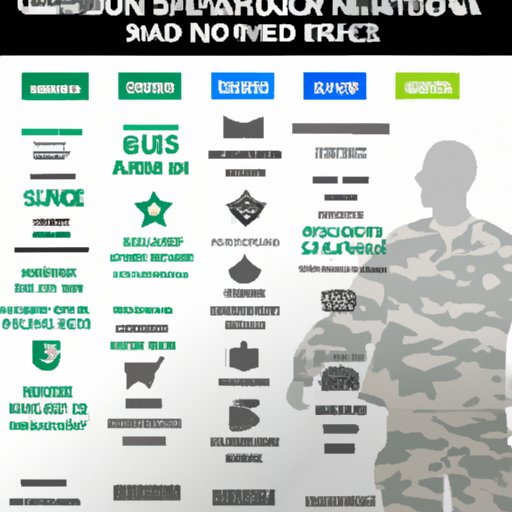Introduction
The United States National Guard is an essential part of our nation’s defense system. As a reserve component of the U.S. Army and Air Force, it serves both state and federal missions. It also provides assistance during natural disasters and other emergencies. With all these responsibilities, it’s no surprise that many people are curious about how much National Guard members make.
In this article, we’ll explore the salaries and benefits of National Guard members. We’ll compare their pay to other branches of the military and look at factors that influence their salaries. We’ll also examine the different ranks and positions in the National Guard, as well as the tax implications of serving. Finally, we’ll investigate how deployment affects National Guard pay.

Comparing National Guard Salaries to Other Military Branches
The National Guard pays its members according to the same pay scale as the U.S. Army and Air Force. This includes a base pay, allowances for housing and food, and extra pay for hazardous duty. All of these components combine to form your total salary.
When compared to other branches of the military, National Guard members tend to make slightly less. This is because they typically serve only one weekend a month and two weeks a year. However, some states may offer additional bonuses or incentives.
Exploring Factors That Influence National Guard Pay
Several factors can influence how much National Guard members make. Location, length of service, and education level all play a role.
Location
Where you serve in the National Guard can have an impact on your salary. Some states may offer higher pay than others. Additionally, certain locations come with hazard pay or other incentives.
Length of Service
Your salary increases with each additional year of service. After four years, you can qualify for a promotion to sergeant. After eight years, you can qualify for a promotion to staff sergeant. Promotion to higher ranks will result in even greater pay raises.
Education Level
Those who hold a college degree may be eligible for additional pay. In addition, those who complete a military training course may qualify for higher pay.
Examining the Benefits of Serving in the National Guard
In addition to a salary, National Guard members receive a number of benefits. These include retirement benefits, health care benefits, and educational benefits.
Retirement Benefits
After 20 years of service, National Guard members are eligible to receive a retirement pension. The amount of the pension depends on the rank and time in service.
Health Care Benefits
National Guard members are eligible for TRICARE, the military health care program. This includes access to military hospitals and a prescription drug plan.
Educational Benefits
National Guard members may be eligible for the Montgomery GI Bill. This provides up to 36 months of education benefits to help pay for tuition, books, and other expenses.
Investigating Different Ranks and Positions in the National Guard
The National Guard consists of three main categories of personnel: enlisted personnel, officers, and warrant officers. Each category has its own set of responsibilities and qualifications.
Enlisted Personnel
Enlisted personnel are the backbone of the National Guard. They carry out most of the day-to-day operations. Their duties include providing support to officers, operating equipment, and carrying out orders.
Officers
Officers are responsible for leading and managing enlisted personnel. They make decisions and provide guidance to ensure the mission is completed successfully. Officers must have a minimum of a bachelor’s degree and must pass a series of tests and evaluations.
Warrant Officers
Warrant officers are experts in their field. They must have a minimum of seven years of experience in their specialty and must pass a rigorous selection process. Warrant officers oversee enlisted personnel and advise officers on matters related to their specialty.

Understanding the Tax Implications of National Guard Pay
It’s important to understand the tax implications of National Guard pay. This includes knowing which income is exempt from taxes and which is taxable.
Tax Exemptions
Certain types of income are exempt from taxes. These include basic pay, special pay, and allowances for housing and food.
Taxable Income
Other types of income are taxable. This includes hazardous duty pay, reenlistment bonuses, and drill pay.

Examining How Deployment Affects National Guard Pay
Deployment can have a big impact on National Guard pay. During deployment, members are eligible for hazardous duty pay, as well as additional benefits such as family separation allowance and combat zone tax exclusion.
Hazard Pay
Hazard pay is an additional form of compensation for those who are exposed to dangerous situations. This includes members who are deployed to areas of conflict or natural disaster zones.
Additional Benefits
In addition to hazard pay, members who are deployed may be eligible for additional benefits. These include family separation allowance and combat zone tax exclusion.
Conclusion
National Guard members are an essential part of our nation’s defense system. This article explored the salaries and benefits of National Guard members. We looked at how their pay compares to other branches of the military and examined factors that influence their salaries. We also investigated the different ranks and positions in the National Guard, as well as the tax implications of serving. Finally, we examined how deployment affects National Guard pay.
In summary, National Guard members make a competitive salary and receive a number of benefits. The amount of pay can vary depending on location, length of service, and education level. Those who are deployed are eligible for additional pay and benefits. Serving in the National Guard is an honorable way to serve your country and protect your community.
(Note: Is this article not meeting your expectations? Do you have knowledge or insights to share? Unlock new opportunities and expand your reach by joining our authors team. Click Registration to join us and share your expertise with our readers.)
